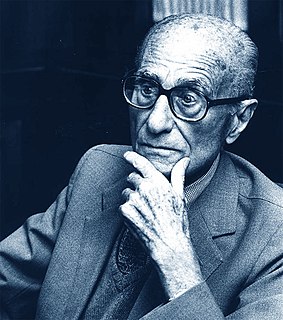A Quote by Indro Montanelli
Which ever one of you will want to become a journalist, let him remember to choose his own master: the reader.
Related Quotes
The analytical writer observes the reader as he is; accordingly, he makes his calculation, sets his machine to make the appropriate effect on him. The synthetic writer constructs and creates his own reader; he does not imagine him as resting and dead, but lively and advancing toward him. He makes that which he had invented gradually take shape before the reader's eyes, or he tempts him to do the inventing for himself. He does not want to make a particular effect on him, but rather enters into a solemn relationship of innermost symphilosophy or sympoetry.
You will be favourable to Burr, and so must fail because the American reader cannot bear a surprise. He knows that this is the greatest country on earth, Washington the greatest man that ever lived, Burr the wickedest, and evidence to the contrary is not admissible. That means no inconvenient facts, no new information. If you really want the reader's attention, you must flatter him. Make his prejudices your own. Tell him things he already knows. He will love your soundness.
Though freedom and wealth are both good things which most of us desire and though we often need both to obtain what we wish, they still remain different. Whether or not I am my own master and can follow my own choice and whether the possibilities from which I must choose are many or few are two entirely different questions. The courtier living in the lap of luxury but at the beck and call of his prince may be much less free than a poor peasant or artisan, less able to live his own life and to choose his own opportunities for usefulness.
If you become a master of meaning, you become a master of your life. Two people can have the same experience. One person decides that because of that experience his or her life is over, while the other decides that God has challenged him or her to step up, face the challenge, and become more than he or she ever was before.
Choose one thing and become a master of it. Choose a second thing and become a master of that. When you become a master of two worlds, say, engineering and business, you can bring them together in a way that will a) introduce hot ideas to each other, so they can have idea sex and make idea babies that no one has seen before and b) create a competitive advantage because you can move between worlds, speak both languages, connect the tribes, mash the elements to spark fresh creative insight until you wake up with the epiphany that changes your life.
Some would define a servant like this: 'A servant is one who finds out what his master wants him to do, and then he does it.' The human concept of a servant is that a servant goes to the master and says, 'Master, what do you want me to do?' The master tells him, and the servant goes off BY HIMSELF and does it. That is not the biblical concept of a servant of God. Being a servant of God is different from being a servant of a human master. A servant of a human master works FOR his master. God, however, works THROUGH His servants.
Buddhas can take you to the boundary line of meditation and samadhi. That is the only difference between meditation and samadhi. If your mind has become utterly quiet and silent, but only the master is there, then it is meditation. If your mind has become so quiet that even the master has disappeared, it is samadhi. The last barrier is going to be the master. He will take you out of the world, but one day you will have to leave him too. And the real master will always keep you alert that you have to leave him one day, at the final stage.
Fallen man is free to choose what he desires, but because his desires are only wicked he lacks the moral ability to come to Christ. As long as he remains in the flesh, unregenerate, he will never choose Christ. He cannot choose Christ precisely because he cannot act against his own will. His fall is so great that only the effectual grace of God working in his heart can bring him to faith.
The boy will remain a son and never become a father. He will be forgotten by the crowd once his blood is rinsed clean from the ground; his sister will think of him but soon she will forget him, too. He will live on only in Han's memory, a child punished not for his own insincerity but someone else's disbelief.
You must never call your enemy by a name you choose for him." “Instead you must call him by the name he calls himself. What he chooses will reflect his pride; it will reveal his desires. But what you choose to call him will reveal your fears, which should be kept to yourself, lest your enemy find the way to exploit them.
Often nothing keeps the pupil on the move but his faith in his teacher, whose mastery is now beginning to dawn on him .... How far the pupil will go is not the concern of the teacher and master. Hardly has he shown him the right way when he must let him go on alone. There is only one thing more he can do to help him endure his loneliness: he turns him away from himself, from the Master, by exhorting him to go further than he himself has done, and to "climb on the shoulders of his teacher."
The difference between the novice and the master is simply that the novice has not learnt, yet, how to do things in such a way that he can afford to make small mistakes. The master knows that the sequence of his actions will always allow him to cover his mistakes a little further down the line. It is this simple but essential knowledge which gives the work of a master carpenter its wonderful, smooth, relaxed, and almost unconcerned simplicity.
Our God...is a consuming fire. And if we, by love, become transformed into Him and burn as He burns, His fire will be our everlasting joy. But if we refuse His love and remain in the coldness of sin and opposition to Him and to other men then will His fire (by our own choice rather than His) become our everlasting enemy, and Love, instead of being our joy, will become our torment and our destruction.

































